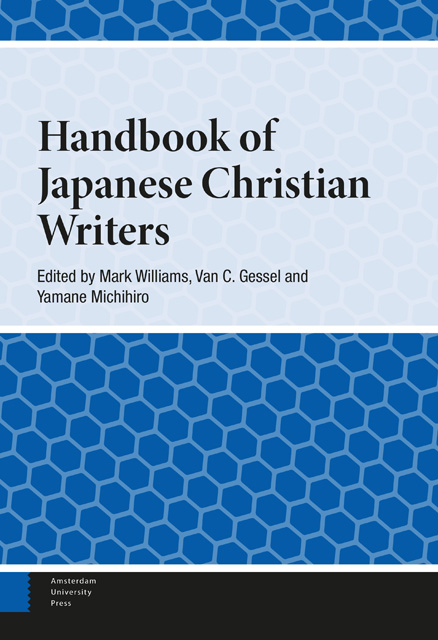Book contents
- Frontmatter
- Contents
- Contributors
- Abbreviations
- Preface
- Introduction
- 1 Prophet of the Inner Life: Kitamura Tōkoku
- 2 Shimazaki Tōson and Christianity: When the Cherries Ripen in the Taishō Period
- 3 Arishima Takeo and Christianity
- 4 Akutagawa Ryūnosuke: A Christian Life
- 5 Incarnation of the Christian Faith in the Poetry of Yagi Jūkichi
- 6 Hori Tatsuo: The Cross Dyed in Bloody Red and the Little Gods of Ancient Times
- 7 Nagai Takashi on Divine Providence and Christian Self-Surrender: Towards a New Understanding of hansai
- 8 Dazai Osamu: His Wrestle with the Bible
- 9 Shiina Rinzō: His Two Visages
- 10 From out of the Depths: Shimao Toshio’s Literary Response to Adversity
- 11 Yasuoka Shōtarō and Christianity: From Postwar “Emptiness” to Religious Longing
- 12 Miura Ayako and the Human Face of Faith
- 13 Endō Shūsaku and the Compassionate Companionship of Christ
- 14 Ogawa Kunio: Renewal of Faith and Identity in His seishomono (Bible Stories)
- 15 Kaga Otohiko: In Search of What Lies Beyond Death
- 16 Sono Ayako: Amor Vincit Omnia
- 17 Takahashi Takako: Drawing Closer to God Through Literature
- Index
- Index of titles
6 - Hori Tatsuo: The Cross Dyed in Bloody Red and the Little Gods of Ancient Times
Published online by Cambridge University Press: 09 June 2023
- Frontmatter
- Contents
- Contributors
- Abbreviations
- Preface
- Introduction
- 1 Prophet of the Inner Life: Kitamura Tōkoku
- 2 Shimazaki Tōson and Christianity: When the Cherries Ripen in the Taishō Period
- 3 Arishima Takeo and Christianity
- 4 Akutagawa Ryūnosuke: A Christian Life
- 5 Incarnation of the Christian Faith in the Poetry of Yagi Jūkichi
- 6 Hori Tatsuo: The Cross Dyed in Bloody Red and the Little Gods of Ancient Times
- 7 Nagai Takashi on Divine Providence and Christian Self-Surrender: Towards a New Understanding of hansai
- 8 Dazai Osamu: His Wrestle with the Bible
- 9 Shiina Rinzō: His Two Visages
- 10 From out of the Depths: Shimao Toshio’s Literary Response to Adversity
- 11 Yasuoka Shōtarō and Christianity: From Postwar “Emptiness” to Religious Longing
- 12 Miura Ayako and the Human Face of Faith
- 13 Endō Shūsaku and the Compassionate Companionship of Christ
- 14 Ogawa Kunio: Renewal of Faith and Identity in His seishomono (Bible Stories)
- 15 Kaga Otohiko: In Search of What Lies Beyond Death
- 16 Sono Ayako: Amor Vincit Omnia
- 17 Takahashi Takako: Drawing Closer to God Through Literature
- Index
- Index of titles
Summary
Hori Tatsuo is not typically thought to be a writer with significantly overt Christian ties. His fascination with Christianity was however real and distinctive. Although he technically never converted, his writings were dotted with religious signifiers, mostly of a Catholic imprint, and in fact his life-long flirtation with Catholicism would become a significant trait pervading his entire oeuvre. Hori's personal negotiations with native religious sensibilities and his efforts to pursue a dialogue between these sensibilities on one side and his Catholic inclinations on the other represented his most tangible contribution to the literary discourse that shaped the interwar years.
Introduction
Although included in the Kindai Nihon kirisutokyō bungaku zenshū (Collected Works of Modern Japanese Christian Literature) series, next to authors like Kitamura Tōkoku (1868– 1894), Kunikida Doppo (1871–1908), Shimazaki Tōson (1872–1943) and Arishima Takeo (1878–1923) who all had meaningful Christian experiences as reflected in their works, Hori Tatsuo (1904–1953) is not typically thought to be a writer with significantly overt Christian ties.1 The pieces included in the series—his 1930 story “Sei kazoku” (The Holy Family), his 1940 short essay “Emao no tabibito” (The Travelers on the Road to Emmaus) and his 1946 work “Yuki no ue no ashiato” (Footprints in the Snow)—may not even be known to the nonspecialist, as they are seldom cited by scholars, particularly overseas, in connection with this topic. In addition, the vast majority of Meiji (1868–1912) and Taishō (1912–1926) authors who were influenced by the Christian faith exhibited a number of shared traits in their process of conversion—such as an early infatuation with politics and the desire to uphold the ideals of freedom and self-determination—that cannot be detected in Hori's oeuvre, and the tensions and motifs typical of Meiji Christian discourse—the debate on the awareness of sin and that epistemological urge to be true to the self—never seemed to concern his artistic output. There was no true confrontation between man and God in Hori's literature and, compared to his own, the literary voices of Meiji Protestantism were merely echoes from a distant past, even though they had been heard only a few decades prior. Nevertheless, Hori's ties with the Christian religion were real and distinctive.
- Type
- Chapter
- Information
- Handbook of Japanese Christian Writers , pp. 99 - 114Publisher: Amsterdam University PressPrint publication year: 2022



